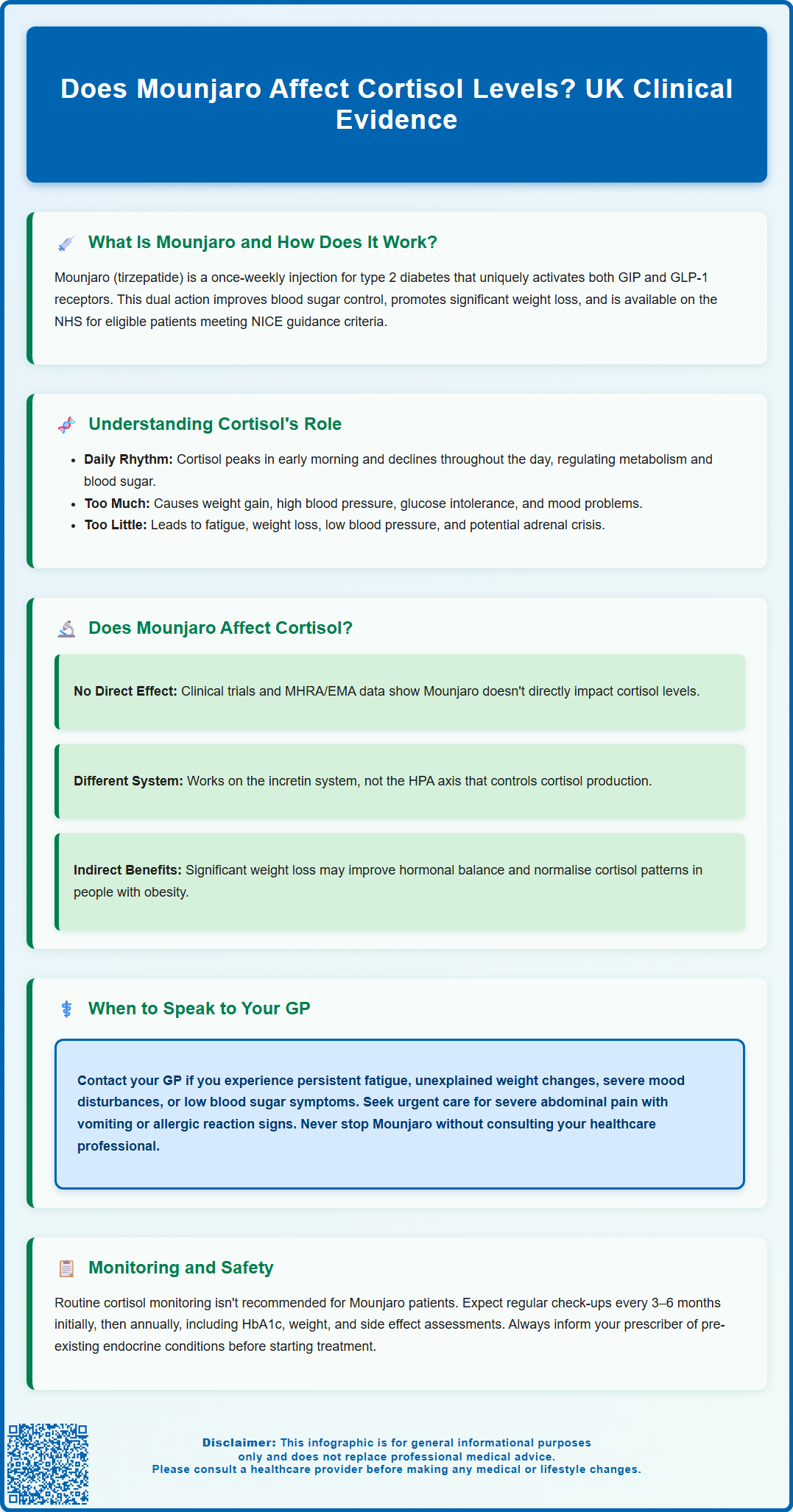Mounjaro (tirzepatide) is a dual GIP and GLP-1 receptor agonist licensed in the UK for treating type 2 diabetes mellitus. As with any medication affecting metabolism and weight, patients may wonder about potential hormonal effects, including impacts on cortisol—the body's primary stress hormone. Cortisol plays essential roles in metabolism, immune function, and stress response, and abnormal levels can cause significant health problems. This article examines the current evidence regarding whether Mounjaro affects cortisol levels, explains how both the medication and cortisol function, and provides guidance on when to seek medical advice about hormonal concerns whilst taking tirzepatide.
Summary: Current clinical evidence shows no clinically meaningful effect of Mounjaro (tirzepatide) on cortisol levels, and routine cortisol monitoring is not recommended for patients taking this medication.
- Tirzepatide is a dual GIP and GLP-1 receptor agonist that targets the incretin system, not the hypothalamic-pituitary-adrenal axis regulating cortisol production.
- Extensive clinical trials including SURPASS and SURMOUNT studies identified no cortisol dysregulation as an adverse effect or safety concern.
- Weight loss from Mounjaro may indirectly influence hormonal systems, but this represents an effect of weight reduction rather than direct pharmacological action on adrenal glands.
- Patients experiencing persistent fatigue, mood changes, or unexplained symptoms should consult their GP for proper evaluation rather than assuming cortisol dysfunction.
- NICE guidance recommends regular monitoring of glycaemic control and tolerability for patients on GLP-1 receptor agonists, but not routine cortisol assessment.
Table of Contents
What Is Mounjaro and How Does It Work?
Mounjaro (tirzepatide) is a prescription medicine licensed in the UK for the treatment of type 2 diabetes mellitus. It is administered as a once-weekly subcutaneous injection and is available through the NHS for eligible patients according to NICE guidance.
Tirzepatide belongs to a novel class of medicines known as dual glucose-dependent insulinotropic polypeptide (GIP) and glucagon-like peptide-1 (GLP-1) receptor agonists. This dual mechanism of action distinguishes Mounjaro from other GLP-1 receptor agonists such as semaglutide (Ozempic, Wegovy) or liraglutide (Victoza, Saxenda). By activating both GIP and GLP-1 receptors, tirzepatide enhances insulin secretion in response to elevated blood glucose levels, suppresses glucagon release (which reduces glucose production by the liver), slows gastric emptying, and promotes satiety—leading to reduced calorie intake and weight loss.
The medicine works primarily through the incretin system, which is a natural hormonal pathway involved in glucose homeostasis. GLP-1 receptors are found in the pancreas, brain, and gastrointestinal tract, while GIP receptors are present in pancreatic beta cells, adipose tissue, and bone. The combined activation of these receptors results in improved glycaemic control and significant reductions in body weight, making Mounjaro an effective option for individuals with type 2 diabetes who also struggle with obesity.
Mounjaro is typically initiated at a low dose (2.5 mg weekly) as a starting dose for treatment initiation and not for glycaemic control. The dose is gradually increased over several weeks to minimise gastrointestinal side effects such as nausea, vomiting, and diarrhoea. The maintenance dose varies depending on individual response and tolerability, with maximum doses reaching 15 mg weekly for diabetes management.

Understanding Cortisol and Its Role in the Body
Cortisol is a steroid hormone produced by the adrenal glands, which sit atop each kidney. Often referred to as the body's primary "stress hormone", cortisol plays a vital role in numerous physiological processes essential for health and survival. It is released in response to stress and low blood glucose levels, following a circadian rhythm with peak levels typically occurring in the early morning and declining throughout the day.
Cortisol has several critical functions in the body:
-
Metabolism regulation: Cortisol helps regulate how the body uses carbohydrates, fats, and proteins. It promotes gluconeogenesis (glucose production) in the liver, ensuring adequate blood sugar levels during fasting or stress.
-
Immune response modulation: Cortisol has anti-inflammatory and immunosuppressive properties, helping to prevent excessive immune reactions that could damage tissues.
-
Blood pressure maintenance: It works alongside other hormones to maintain cardiovascular function and blood pressure stability.
-
Stress response: Cortisol is central to the body's "fight or flight" response, mobilising energy reserves and heightening alertness during perceived threats.
Abnormal cortisol levels can lead to significant health problems. Hypercortisolism (excess cortisol), as seen in Cushing's syndrome, may cause weight gain (particularly central obesity), hypertension, glucose intolerance, muscle weakness, and mood disturbances. Conversely, hypocortisolism (insufficient cortisol), characteristic of Addison's disease or adrenal insufficiency, can result in fatigue, weight loss, low blood pressure, and potentially life-threatening adrenal crisis.
Cortisol levels are typically measured through morning blood tests (09:00 serum cortisol), salivary samples, or 24-hour urine collections. More specialised tests include the short Synacthen test and dexamethasone suppression test. The hypothalamic-pituitary-adrenal (HPA) axis tightly regulates cortisol production, with the hypothalamus releasing corticotropin-releasing hormone (CRH), which stimulates the pituitary gland to secrete adrenocorticotropic hormone (ACTH), ultimately triggering cortisol release from the adrenal cortex.
Does Mounjaro Affect Cortisol Levels?
Based on current clinical evidence and regulatory data from the Medicines and Healthcare products Regulatory Agency (MHRA) and European Medicines Agency (EMA), there is no evidence of a clinically meaningful effect of Mounjaro (tirzepatide) on cortisol levels. The extensive clinical trial programme for tirzepatide, including the SURPASS and SURMOUNT studies, did not identify cortisol dysregulation as an adverse effect or safety concern.
Tirzepatide's mechanism of action targets the incretin system through GIP and GLP-1 receptors, which are not directly involved in the hypothalamic-pituitary-adrenal (HPA) axis that regulates cortisol production. The drug primarily affects glucose metabolism, appetite regulation, and gastric motility rather than adrenal hormone synthesis. Routine monitoring of cortisol levels is not recommended for patients taking Mounjaro unless there are specific clinical indications unrelated to the medication itself.
However, it is important to recognise that significant weight loss—a common outcome with Mounjaro treatment—may theoretically influence various hormonal systems in the body. Weight reduction may improve insulin sensitivity, reduce inflammation, and potentially affect stress hormone dynamics indirectly. Some patients with obesity may have mild elevations in cortisol or altered cortisol metabolism related to their weight status, and substantial weight loss could potentially normalise these patterns, though evidence for this specific effect is limited. This would represent an indirect effect of weight reduction rather than a direct pharmacological action of tirzepatide on the adrenal glands.
Patients should be aware that symptoms sometimes attributed to cortisol imbalance—such as fatigue, mood changes, or sleep disturbances—may have multiple causes. If you experience persistent or concerning symptoms whilst taking Mounjaro, these should be discussed with your GP, who can determine whether investigation of cortisol levels or other hormonal assessments is warranted. It is essential not to assume that such symptoms are necessarily related to either the medication or cortisol dysfunction without proper medical evaluation.
When to Speak to Your GP About Mounjaro and Hormone Levels
Whilst Mounjaro does not typically affect cortisol levels, there are several situations where you should contact your GP or healthcare professional regarding potential hormonal concerns or medication-related issues:
Seek medical advice if you experience:
-
Persistent fatigue or weakness that does not improve with rest and interferes with daily activities, particularly if accompanied by dizziness, low blood pressure, or darkening of the skin (which could suggest adrenal insufficiency, though unrelated to Mounjaro)
-
Unexplained weight changes beyond expected weight loss, especially if accompanied by other symptoms such as excessive thirst, increased urination, or changes in appetite
-
Mood disturbances including persistent low mood, anxiety, or irritability that significantly affects your quality of life
-
Sleep pattern disruptions that are severe or do not resolve, as sleep quality can influence both metabolic health and hormonal balance
-
Signs of hypoglycaemia (low blood sugar) such as trembling, sweating, confusion, or palpitations, particularly if you are taking Mounjaro alongside other diabetes medications like insulin or sulphonylureas
-
Severe or persistent abdominal pain, especially if accompanied by vomiting, which could indicate pancreatitis requiring urgent medical attention
-
Signs of allergic reaction such as rash, itching, swelling, severe dizziness, or difficulty breathing
NICE guidance (NG28) recommends regular monitoring for patients on GLP-1 receptor agonists, including assessment of glycaemic control (HbA1c), weight, and tolerability of gastrointestinal side effects. Your GP or diabetes specialist nurse will typically review your progress every 3–6 months initially, then at least annually once stable.
If you have a pre-existing endocrine condition such as thyroid disease, adrenal insufficiency, or pituitary disorders, inform your prescriber before starting Mounjaro. Whilst there are no known direct interactions with cortisol regulation, comprehensive management of multiple endocrine conditions requires coordinated care.
Do not stop taking Mounjaro without consulting your healthcare professional, even if you experience side effects. Many adverse effects, particularly gastrointestinal symptoms, improve with time or dose adjustment. Your GP can help determine whether symptoms warrant investigation, medication adjustment, or referral to specialist endocrinology services if hormonal imbalance is suspected.
If you suspect you are experiencing side effects from Mounjaro, you can report these through the MHRA Yellow Card Scheme, which helps monitor the safety of medicines in the UK.
Scientific References
- Mounjaro | European Medicines Agency (EMA).
- Mounjaro KwikPen 10mg solution for injection in pre-filled pen - Summary of Product Characteristics (SmPC).
- Type 2 diabetes in adults: management (NG28).
- Tirzepatide Once Weekly for the Treatment of Obesity.
- Effects of Weight Loss on Key Obesity-Related Biomarkers Linked to Cancer Prevention.
Frequently Asked Questions
Can Mounjaro cause changes in cortisol production?
No, Mounjaro (tirzepatide) does not directly affect cortisol production. Its mechanism targets the incretin system through GIP and GLP-1 receptors, which are not involved in the hypothalamic-pituitary-adrenal axis that regulates cortisol.
Do I need cortisol monitoring whilst taking Mounjaro?
Routine cortisol monitoring is not recommended for patients taking Mounjaro unless there are specific clinical indications unrelated to the medication itself. Your GP will arrange standard diabetes monitoring as per NICE guidance.
Could weight loss from Mounjaro affect my hormone levels?
Significant weight loss may indirectly influence various hormonal systems, potentially improving insulin sensitivity and reducing inflammation. However, this represents an effect of weight reduction rather than a direct action of tirzepatide on hormone production.
The health-related content published on this site is based on credible scientific sources and is periodically reviewed to ensure accuracy and relevance. Although we aim to reflect the most current medical knowledge, the material is meant for general education and awareness only.
The information on this site is not a substitute for professional medical advice. For any health concerns, please speak with a qualified medical professional. By using this information, you acknowledge responsibility for any decisions made and understand we are not liable for any consequences that may result.
Heading 1
Heading 2
Heading 3
Heading 4
Heading 5
Heading 6
Lorem ipsum dolor sit amet, consectetur adipiscing elit, sed do eiusmod tempor incididunt ut labore et dolore magna aliqua. Ut enim ad minim veniam, quis nostrud exercitation ullamco laboris nisi ut aliquip ex ea commodo consequat. Duis aute irure dolor in reprehenderit in voluptate velit esse cillum dolore eu fugiat nulla pariatur.
Block quote
Ordered list
- Item 1
- Item 2
- Item 3
Unordered list
- Item A
- Item B
- Item C
Bold text
Emphasis
Superscript
Subscript










